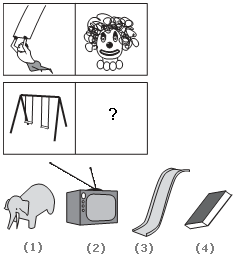Discussion
Home ‣ Logical Reasoning ‣ Statement and Argument See What Others Are Saying!
- Question
Statement: Should the vehicles older than 15 years be rejected in metros in India?
Arguments:
- Yes. This is a significant step to lower down the pollution level in metros.
- No. It will be very difficult for vehicle owners to shift to other parts in country because they will not get suitable job for their very existence.
Options- A. Only argument I is strong
- B. Only argument II is strong
- C. Either I or II is strong
- D. Neither I nor II is strong
- E. Both I and II are strong
- Correct Answer
- Only argument I is strong
ExplanationClearly, 15 year old vehicles are not Euro-compliant and hence cause much more pollution than the recent ones. So, argument I holds. Argument II is vague since owners of these vehicles need not shift themselves. They might sell off their vehicles and buy new ones - a small price which every citizen can afford for a healthy environment. - 1. Choose the picture that would go in the empty box so that the two bottom pictures are related in the same way as the top two:

Options- A. 1
- B. 2
- C. 3
- D. 4 Discuss
- 2. Statements: Some dreams are nights. Some nights are days.
Conclusions:
- All days are either nights or dreams.
- Some days are nights.
Options- A. Only conclusion I follows
- B. Only conclusion II follows
- C. Either I or II follows
- D. Neither I nor II follows
- E. Both I and II follow Discuss
- 3. Statement: Why don't you invite Anthony for the Christmas party this year?
Assumptions:
- Anthony is not from the same city.
- Unless invited Anthony will not attend the party.
Options- A. Only assumption I is implicit
- B. Only assumption II is implicit
- C. Either I or II is implicit
- D. Neither I nor II is implicit
- E. Both I and II are implicit Discuss
- 4. Look at this series: 2, 1, (1/2), (1/4), ... What number should come next?
Options- A. (1/3)
- B. (1/8)
- C. (2/8)
- D. (1/16) Discuss
- 5. book
Options- A. fiction
- B. pages
- C. pictures
- D. learning Discuss
- 6. Statements: Some tables are TVs. Some TVs are radios.
Conclusions:
- Some tables are radios.
- Some radios are tables.
- All radios are TVs.
- All TVs are tables.
Options- A. None follows
- B. All follow
- C. Only I and III follow
- D. Only II and IV follow Discuss
- 7. Statements: Some tigers are lions. Some lions are rabbits. Some rabbits are horses.
Conclusions:
- Some tigers are horses.
- Some rabbits are tigers.
- Some horses are lions.
- All horses are rabbits.
Options- A. All follow
- B. None follows
- C. Only I and II follow
- D. Only II and IV follow
- E. Only IV follows Discuss
- 8. Which word does NOT belong with the others?
Options- A. branch
- B. dirt
- C. leaf
- D. root Discuss
- 9. pain
Options- A. cut
- B. burn
- C. nuisance
- D. hurt Discuss
- 10. champion
Options- A. running
- B. swimming
- C. winning
- D. speaking Discuss
More questions
Correct Answer: 3
Explanation:
A trapeze performer is to a clown as swings are to a sliding board. This relationship shows a classification. Trapeze performers and clowns are found at circuses; swings and sliding boards are found on playgrounds.
Correct Answer: Only conclusion II follows
Explanation:
Since both the premises are particular, no definite conclusion follows. However, II is the converse of the second premise and thus it holds.
Correct Answer: Only assumption II is implicit
Explanation:
Anthony's place of living is not mentioned in the statement. So, I is not implicit. Assumption II follows from the statement and so it is implicit.
Correct Answer: (1/8)
Explanation:
This is a simple division series; each number is one-half of the previous number.
In other terms to say, the number is divided by 2 successively to get the next result.
4/2 = 2 2/2 = 1 1/2 = 1/2 (1/2)/2 = 1/4 (1/4)/2 = 1/8 and so on.
Correct Answer: pages
Explanation:
The necessary part of a book is its pages; there is no book without pages. Not all books are fiction (choice a), and not all books have pictures (choice c). Learning (choice d) may or may not take place with a book
Correct Answer: None follows
Explanation:
Since both the premises are particular, no definite conclusion follows.
Correct Answer: None follows
Explanation:
Since each combination of premises shall contain two particular premises, no definite conclusion can be drawn.
Correct Answer: dirt
Explanation:
A branch, leaf, and root are all parts of a tree. The dirt underneath is not a part of the tree.
Correct Answer: hurt
Explanation:
Pain is suffering or hurt, so choice d is the essential element. Without hurt, there is no pain. A cut (choice a) or a burn (choice b) may cause pain, but so do many other types of injury. A nuisance (choice c) is an annoyance that may or may not cause pain.
Correct Answer: winning
Explanation:
Without a first-place win, there is no champion, so winning is essential. There may be champions in running, swimming, or speaking, but there are also champions in many other areas.
Comments
There are no comments.More in Logical Reasoning:
Programming
Copyright ©CuriousTab. All rights reserved.
